Torture and abuse in 2020 – story of Masha M.
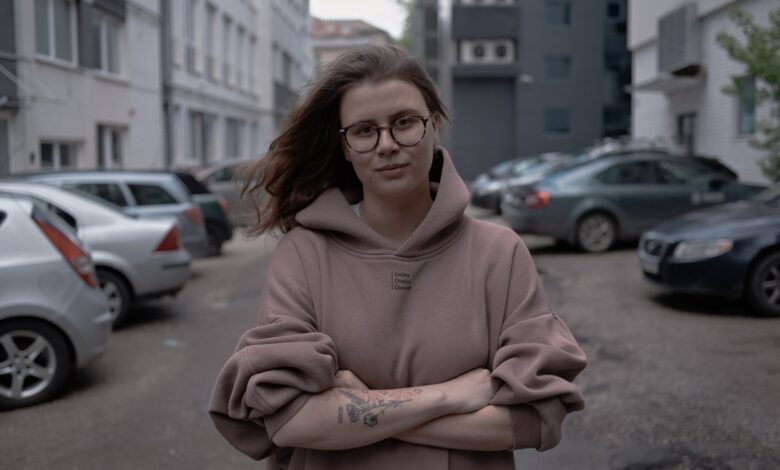
22 years old, journalist. “I didn’t even know Akrestsina existed”
Masha is a Lithuanian citizen but has spent most of her life in Belarus. She was in Belarus after the presidential election in August 2020, too. According to her, unlike other detainees, she, her husband, and their friend did not sustain serious physical damage. But she adds that it was then that she realized for the first time how easy it was to take one’s freedom and life. Masha distinctly remembers the fear of death, which she has never experienced before.
“What are you, Lithuanian? Just you wait: you’ll get 12 years behind bars and never see your homeland again!”
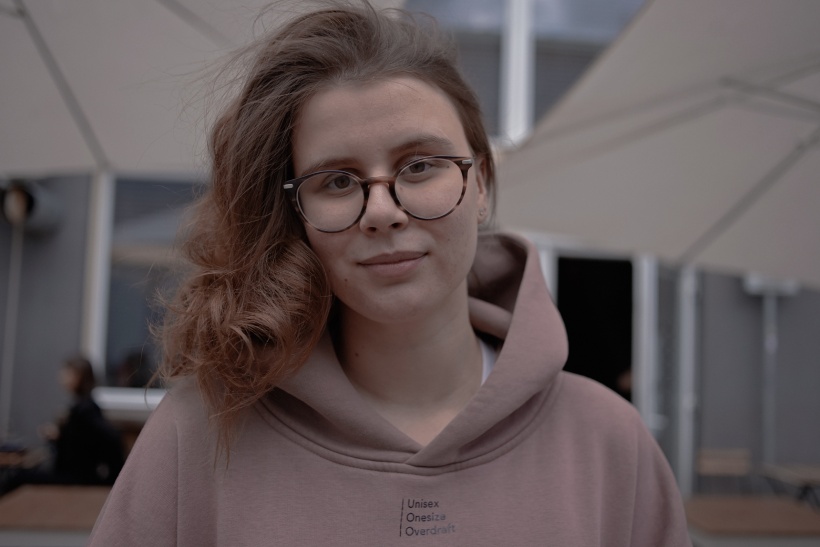
August 9 was just like something out of a movie: cordons, riot police, stun grenades, chases. Seasoned oppositioners from London told us there might be arrests (a few years ago, Masha dropped out of her university in Belarus and went to conquer London. – August2020). So, I was prepared to get a couple of days behind bars, but I didn’t think there would be so much violence. After a night like that, I wasn’t sure I was ready to go out to protest again.
I felt bad, so I consulted my friend Maryk (we weren’t married then). We decided to go since we had a car and could block the roads. By some miracle, we finally departed from Pushkinskaya subway station. I say “miracle”, and I am so embarrassed. On the evening of August 10, we managed to connect to the Internet: we were reading the news and crying silently. We were thinking over our August 11 plans for a long time. Then, a thought occurred to me: young women used to be nurses during wartime. I put a message out to the Belarusian diaspora group in London that we wanted to buy water and medicines. The people chipped in, and we made 180 first aid kits: each contained bandages, hydrogen peroxide, band-aids, and a little memo on how the kit contents should be used. We also bought 200 small bottles of water.
We thought that putting red cross marks on the car and on those of us who would be running was a good idea. My friend and I made armbands out of white bandages and red tape. We started from Serabranka, stopped at the barricades, and went to Piatroushchyna and Malinauka, the Riga mall neighborhood, Zialiony Luh, and Kamennaya Horka after the scuffles were over. We thought that our final destination would be Pushkinskaya subway station. We agreed not to drive through downtown. But Niamiha looked empty and quiet. I said to the guys: “Why don’t we take a shortcut?” It’s not like we’re participating in the protests: we are medics. I thought they wouldn’t touch medics.
“They immediately pushed me against the car hood, almost like in American movies, and took the guys to the trunk“
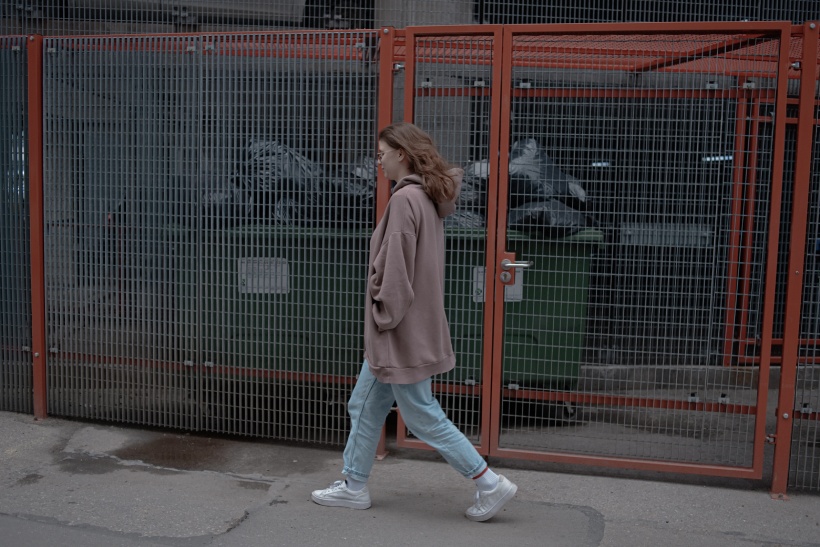
We didn’t notice a traffic police car immediately, but it was riot policemen (OMON) who detained us. They immediately pushed me against the car hood, almost like in American movies, and took the guys to the trunk. They were recording everything with a video camera. They took the rest of the medicines, the flag, spray paint cans, and a Halloween mask. It turned out that we also had a hunting knife in the car. They made a show of laying the flag on the sidewalk and placed everything found in the car and a water pistol Maryk and I had bought at a discount on top of the flag. Ironically, the water pistol was white and red. The most dangerous weapon in the world!
I had my passport and Belarusian residence permit with me. No one cared about the latter. “What are you, Lithuanian? Just you wait: you’ll get 12 years behind bars and never see your homeland again!” Foul language, threats. They asked how much we had been paid and why I hadn’t stayed in “my” Lithuania. But Minsk and Belarus have always been my homeland.
They wouldn’t let me look in the general direction of where the guys were. At some point, I got scared that they had made me face the car hood for a reason, that they might rape me or do something else. It was obvious that the riot policemen were very happy about our arrest, literally ecstatic. We later learned that they were given bonuses for detaining medics and journalists. They did not listen to our explanation that we were volunteers. “What, you helped all those protesters, those traitors, didn’t you?”
They smoked a lot, talked fast, and acted like dogs at the sight of fresh meat. I am 100% sure they were stoned. The climax was when they said: “That’s it, let’s pack them up.” They twisted my hands behind my back and led us into a minibus. Then they brought in a curly-haired guy. As soon as the door closed, the riot police started beating the guys up. I think they threw the curly-haired guy on the floor and started kicking and beating him with a truncheon. He later told us that one of those freaks had put out a cigarette on his knee.
“My first thought was that they would take us to the woods, and that would be the end of us: no one would find us after that”
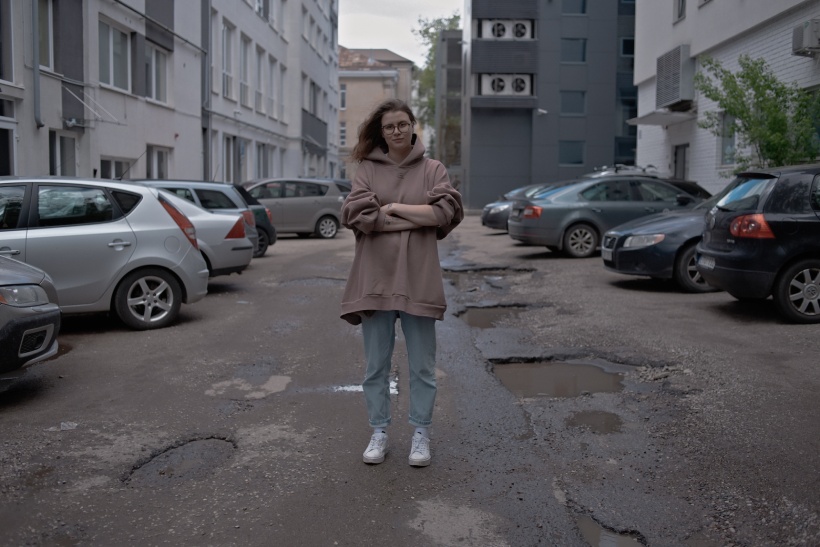
It took them a long time to decide where to take us. “Let’s go to the Frunzenski police department since all the other departments are overcrowded anyway.” My first thought was that they would take us to the woods, and that would be the end of us: no one would find us after that. The second thing I did was apologize quietly to the guys for getting them into this. We later went to therapy together and realized that no one blamed anyone for anything. But before that, I blamed myself for so many things.
At first, they were beating everyone but me. But then a riot policeman started punching me in the head, neck, and back saying: “You’re from Lithuania, and there is feminism in Lithuania. That means you’re going to get beaten like everyone else.” He had gloves on his hands, and the punches to my neck were the most painful. But their attention was mostly on the curly guy: they were pummeling him mercilessly. That riot policeman clearly went into a frenzy.
We arrived at the police department, and yells were coming from everywhere: “Hurry up! Faster! Faster!” We must hurry, we’re late! Each of us had a riot policeman escorting them, and I was limping around on my bandaged foot (I had a cosmetic procedure before August 9).
“It’s okay, take your time,” said “my” riot policeman.
“What did you say?!” I turned to him, wide-eyed.
“Take your time, you have a foot problem.”
“Thank you,” said I and thought: “Holy f*ck! You have just beaten the sh*t out of us, and now you’re letting me take my time?!” We passed through the basement and entered a gym, and I was f*cking floored by what was going on there. One of the riot policemen said: “See that dude over there? He has soiled himself in fear, and it’d be the same with you.” There were about 100–150 people in the gym.
They made us kneel with our heads on the floor and handcuffed us. There was a disgusting smell of urine, sweat, and blood in the gym. Yet, the first shock was not from being beaten but from how they talked to us: some mixture of white trash talk and foul language. When we arrived, the police drew black crosses on our white bands. I paid it no mind then. I only noticed the markings when they returned my belongings. We were lucky that these colored labels had been cut off during the inventory. Perhaps, not everyone knew what this color-coded labeling meant back then. I can’t imagine what they could have done to us. (The instances of color-coded labeling in detention have come to light since early August 2020. Those marked in black were subjected to the most brutal torture. According to unverified information from the “Nash Dom” Civic Campaign, such a detainee could theoretically be killed. – August2020)
“They left me near the shooting range, and it was a bona fide torture chamber“
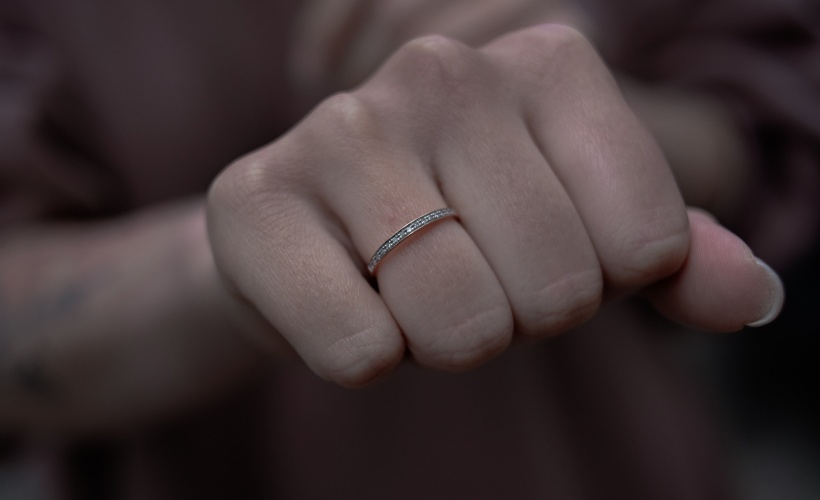
It became clear that we would not get out soon. They put me in front of a scrawny riot policeman in a black balaclava. And so it began: “What is it that you don’t like?” I guess I have to thank the therapy sessions: they helped me realize that it was not an interrogation but an attempt at pressurizing me. “I just wanted to help!” “How much were you paid?” “Nobody paid me, and it was my own decision to come!” I spoke calmly, even though it was unclear how I should talk with them to not get beaten. “So how old are you?” “I am 21, and you?” “I’m in my forties.” “Well then, I’m too young. When I’m your age, I’ll understand everything.” And he left me alone. I don’t know if I somehow won him over, but the other riot policemen were making fun of me.
They left me near the shooting range, and it was a bona fide torture chamber. The moans and screams were inhuman. I only realized that it was an investigator talking to me because of his planner and manner of communication. I was sitting on a bench, and handcuffed men were lying by the wall. Some were standing in a “swallow position”: face down with hands behind the head. They were trampled on, beaten, and recorded on video. The policemen promised to put me there with them if I didn’t answer the questions. The investigator asked me where the money for the medications came from. I replied: “I’ve lived in London and earned it.” “Are you from Belarus?” – “Yes.” – “But you have a Lithuanian passport?” – “Yes.” – “You’ve lived in London?” – “Yes.” His brain must have exploded at this.
They recorded a 360-degree video of me and sat me down next to the shooting range again. Then I felt my heart drop: Maryk was led to the shooting range, and my other friend was led to the end of the corridor. When I heard a new voice from the shooting range, I started crying: I was sure it was Maryk’s voice. It was a terrible and painful feeling. But he was only interrogated. I sat next to the shooting range for two hours. Those who went in there had to be dragged out later. I couldn’t think of anything better to do than to defiantly stare into everybody’s face and try to memorize their last names. There was still hope that they would let us out earlier because of my Lithuanian passport, and I would be able to report the abuse.
“It was scary then, too: there were four men and one of me in the gym“
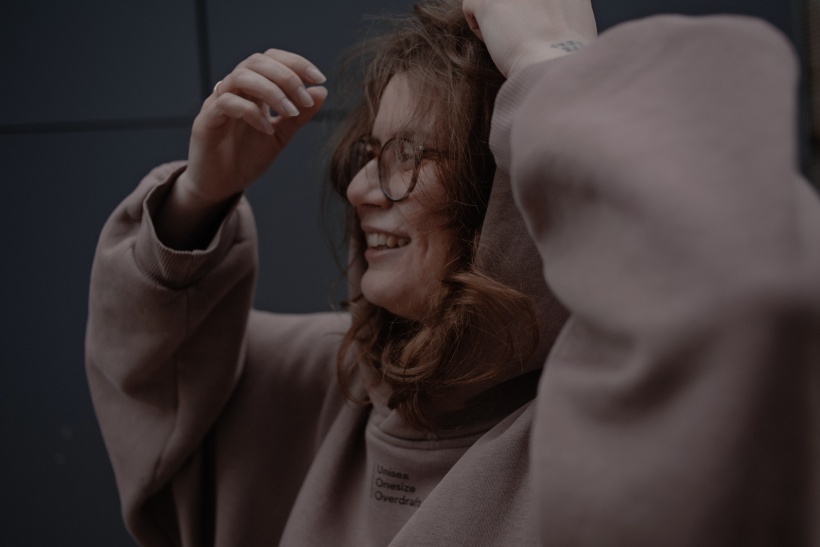
Investigator Maksim Yauseievich searched our car. Only four policemen were at the shooting range when I signed the search report. Some smoked, some sat relaxed – as if nothing had happened! It was scary then, too: there were four men and one of me in the gym. But apparently, they still had some principles.
A few young women were sitting next to me in the gym. There was a guy with a broken nose, and some were lying. I couldn’t find my companions, but I saw Carrot-top (that’s what Masha calls a red-haired guy who was among the detainees. – August2020). They cut his jeans and underwear on the buttocks and beat him with truncheons. He couldn’t sit, so he had to be on his knees. The investigator approached me several times and asked: “Are you really Maryia [in Belarusian, Masha is a diminutive of Maryia] Matusevich?” I guess my name was not in the database because of my citizenship.
I went to where they inventoried my belongings. Two female traffic police officers – a blonde and a redhead – were doing the inventory. Rare human specimens they were, that’s for sure. They wrote in the inventory report that they had read me my rights. “Excuse me, but there’s a paragraph… What rights do I actually have?” – “Sign it!” – “Wait a moment, please…” But they stood their ground, demanded that I sign it, and called a riot policeman. Yeah, well. I had my friend’s phone. They found him in the crowd, forced him to unlock it, and saw correspondence about the events at the Stela on August 9. A riot policeman made him kneel and started beating him with a truncheon in front of my eyes. Of the three of us, he was the most beaten up.
After a while, I got into a dialogue with lieutenant Andrei Khvainitski. He asked me why I, being so young, had gotten into this mess. I couldn’t take this anymore and asked him if he liked his job. “I get a salary and don’t give a damn about who is in power.” He is 21 years old. He didn’t do anything bad: on the contrary, he would take us to the bathroom, give us water, and he took off my handcuffs. But! He was a witness to all this lawlessness.
I asked Carrot-top why the riot police were so hard on him. It turned out he had a white-red-white lock screen on his phone. We were whispering, and a riot policeman came up to us: “What are you whispering about?” My reaction to this stress was: “I was saying that I wanted a coffee and that I wished I could have a cigarette.” I don’t remember what he replied, but he let me sit with my friends.
“She smashed eight cell phones. She did it in the most perverted and performative way possible: she smashed the phones against the wall, put them on the floor, and hit them repeatedly with a truncheon”
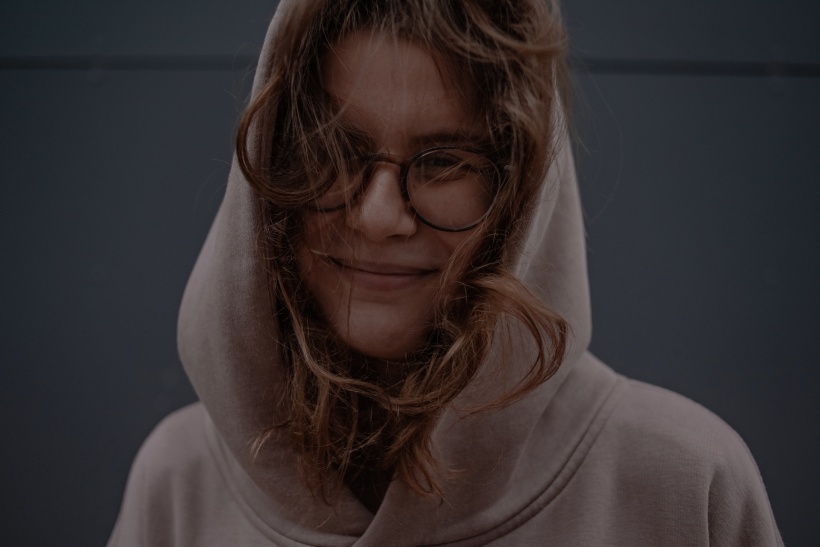
Some prick saw that I wasn’t handcuffed. My hands turned blue from zip-ties very quickly. We started signing police reports. Those who didn’t agree to do so were beaten. It was a shift change time. And the one and only Karyna-Krystsina entered, blowing the door off its hinges with her feet. (The detainees from the Frunzenski district police department in Minsk talked about the “riot policewoman Krystsina” beating people in the gym. Some detainees reported that the riot policewoman’s name was Karyna. – August2020)
She got everybody up and made us stand. Whoever wasn’t handcuffed before was handcuffed now. All this was happening in the morning: people’s phones started ringing, and alarm clocks were going off. She smashed eight cell phones. She did it in the most perverted and performative way possible: she smashed the phones against the wall, put them on the floor, and hit them repeatedly with a truncheon. She also made a “nice gesture” by moving all the women to the wall. But then she made us all stand up, and we had to stand facing the wall.
I was on the verge of fainting and asked for water. Karyna-Krystsina left and came back with two bandages soaked in ammonium chloride solution and shoved them up my nose. It was only a couple of seconds, but this “energy charge” was quite harsh. It was painful and unpleasant, but I came to my senses.
They began moving us from one place to another and preparing to transport us elsewhere. At one point, a cop burst into the gym, wide-eyed, carrying a couple of bananas and energy drinks. He offered them to women. I took a little sip of an energy drink. When only about 15 people were left, the riot policemen took a long time to decide what to do with me. At this point, I got cocky: I bucked and rattled my handcuffs and asked if I could go to the bathroom. The riot policeman who was escorting me undid my handcuffs and said: “Go wash yourself up in there, walk around and stretch your legs.” Wow! I wanted to tie my hair, but the only thing they hadn’t found when they’d searched me was a white silicone bracelet. The riot policeman noticed it and said that if someone saw it, they would kill me.
“Men were singing the anthem of Belarus while being beaten up”
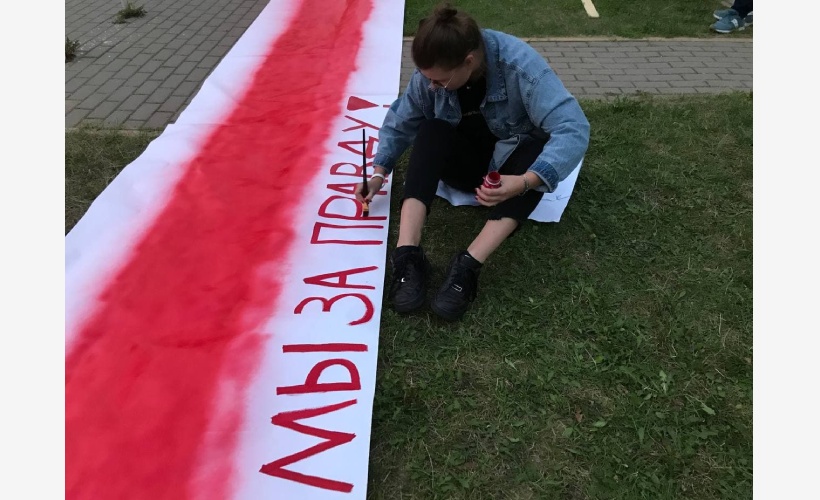
They put me in a tall box in a prisoner transporter. There was a shelf I slept on, on my way to Akrestsina. When we heard some popping sounds, we realized we were in the city. I didn’t even know Akrestsina existed. There were more people, they began to sit people down on the grass, and women were allowed to stand in one group.
There were cops, riot policemen, and what looked like military officers in green- and sand-colored camouflage uniforms everywhere. I am proud of the girls who kept demanding to be let go and complaining that they were cold. The cops told them to do squats and made dirty jokes. I don’t remember what one of the girls said, but I remember thinking: “Damn, you rock, girl!”
It seemed we stood there indefinitely. Then, the dudes in sand-colored uniforms brought a canopy. The cops and riot policemen said nothing. Apparently, the military were held in high regard there. The girls and I grouped together and tried to keep warm.
When it got dark, they started moving us again. They took us into the building, made us stand against the wall, and ordered us to strip naked and squat down. I thought it would be warm inside, but all 35 of us, girls, were led out into an open-air concrete courtyard. We decided that those dressed warmer would lie down by the wall. We pulled out our insoles, put them under our bums, grouped together, and lay down. I missed all the best spots and had to lie against the wall. I felt cold in a T-shirt, jeans, and sandals. Someone was crying, someone was exercising, and I fell asleep.
“That could have been all right, but there was a woman who sobered up in the cell, had a bout of alcohol withdrawal delirium, and hit her head against the wall“
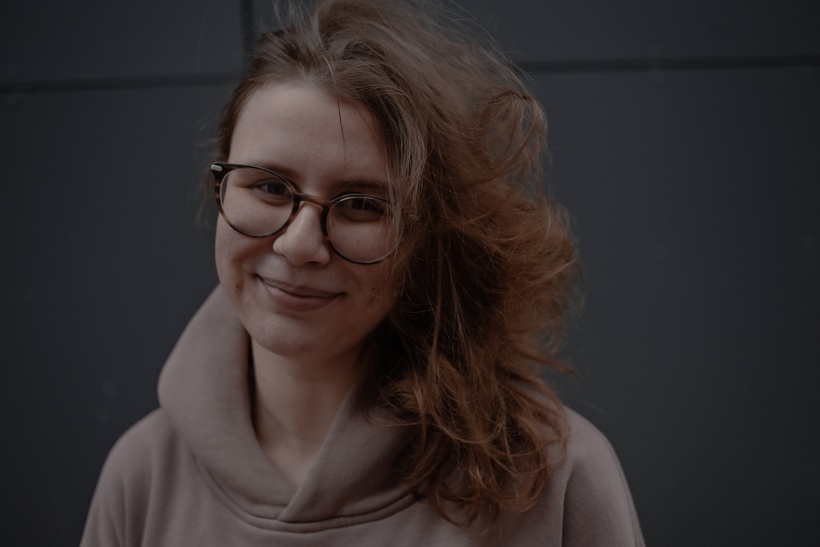
I woke up to the wildest yells. Men were singing the anthem of Belarus while being beaten up. One could not bear listening to this. I wasn’t the only one detained with friends or boyfriends. So we just cried silently. The yells and screams like “I love OMON” could be heard almost non-stop: new people were brought in all the time.
I ended up in a cell with another 30–40 people. That could have been all right, but there was a woman who sobered up in the cell, had a bout of alcohol withdrawal delirium, and hit her head against the wall. The only thing the law enforcers did during that time was throw bandages into the cell. We shouted into the feeder [an opening in the door through which inmates are given food] and asked to call an ambulance for her. They threatened that if we didn’t shut up, they would gang-rape us and pour water into the cell. It was hot in the cell, but it felt nice after being outside. The girls who had been there since August 9 said they had been given only one loaf of bread. Same with water. But the screams and sounds of beatings carried in without fail.
There was a thin gray carpet next to the nightstand. I curled up on it and fell asleep. I heard someone call out my last name an hour later. A girl named Liza and I were dragged up and down different floors for a long time. Everything was unclear and scary. With all this turmoil around, no one knew how many people there were and where they were. I could see through an open feeder that guys in one of the cells were sitting in their underwear. (It is possible that this was the so-called “beach boys” cell that Viachka Krasulin talked about – August2020)
They led us away and forbade us to look around. But we still kept seeing people standing and lying against the walls, pools of blood. We went out, and I couldn’t understand where we were. A soldier came up and said that we were on Akrestsina Street near Mikhalova subway station, and there were volunteers in the other direction. But he advised against going to the volunteers. “What?! Why not go to the volunteers? What’s the problem?”
“I was wrapped in a blanket, I was exhausted, so I just fell into the bushes”
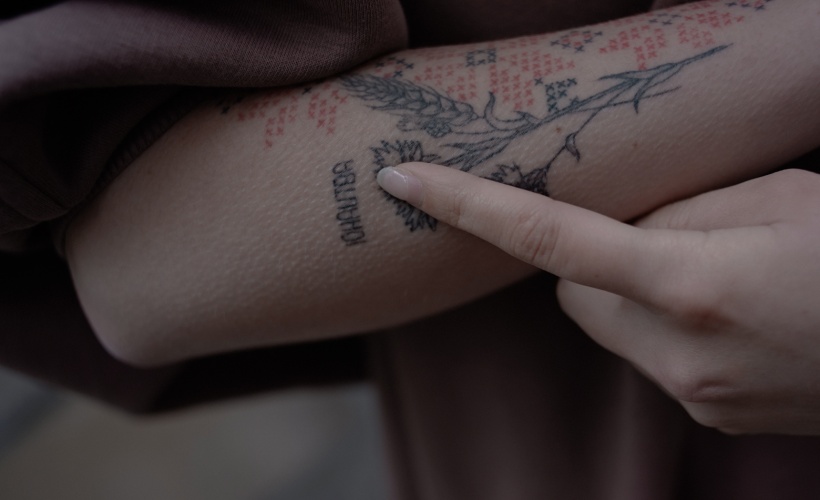
Volunteers gave me a blanket. I asked for a cell phone and started sending Instagram messages to everyone whose Insta handles I remembered. Naturally, no one would reply at 4 am. I wanted a smoke. But I didn’t have time to finish my cigarette: everyone started running away, and some guy yelled, “OMON!”. I’m not sure now if it was the riot police. I don’t know of anyone who was there at the time and could confirm it. But people ran.
I was wrapped in a blanket and exhausted, so I just fell into the bushes. I was holding my breath, and people kept on running past me. After all this calmed down for a while, I realized that the bushes weren’t a good cover, and I at least needed to get to the avenue. I crumpled the blanket up so that it wouldn’t look like I was one of “those”. I walked and walked and then noticed two riot policemen wearing tactical helmets about 20 meters away. Don’t look, don’t look! I felt such panic and fear that I hid in a porta-potty. I was lucky to have a blanket with me: somehow, I managed to sit down. I sat there for about two hours. I decided that I would only come out when I heard noises from the general direction of the avenue.
After a while, I heard some guy on the phone saying he was going to the volunteers. Apparently, he wanted to go to the bathroom on his way there: he jerked the handle, and I sprang out at him. “Take me to the avenue, I live not far from here, just take me there!” I was in such a hysterical state. He took me to the volunteers.
The only address I remembered was that of a friend. Friends were greeting me in tears. It was clear that they already knew about our detention and that they were looking for us. I couldn’t tell them anything. It felt like it wasn’t happening to me, like I was lying and making things up. It was a bizarre feeling.
My friends were released the next day, August 14, in Slutsk [a city in Belarus located about 100 kilometers south of Minsk]. I went to meet them wearing my pajama pants because I was in a hurry, and that was how I left home.
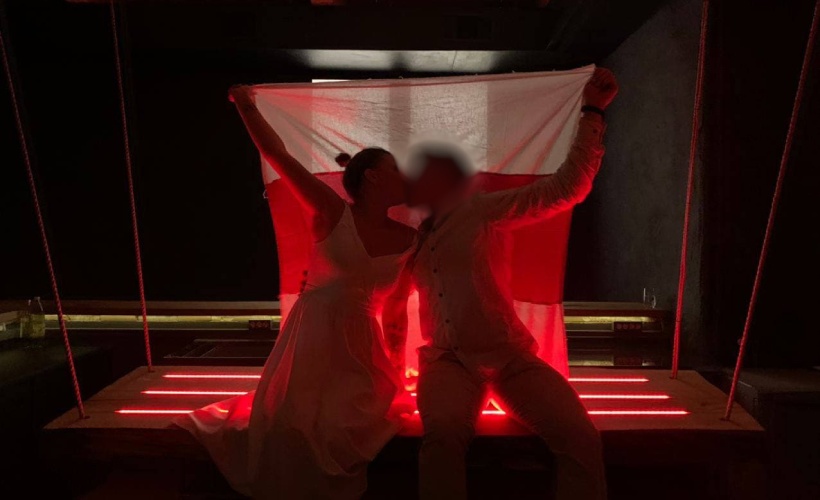
P.S. In November, Masha found out that there was an ongoing court case on the cancellation of her residence permit in Belarus. Later, her lawyer reported that she had been fined 20 base units (equivalent to approximately $220 USD in 2020), her residence permit had been canceled, and she had received a five-year entry ban to Belarus. But there is a positive side to this story. Upon his release, Maryk confessed to Masha: back then, in the Akrestsina detention center, while crouching in the “face to floor” position, he realized she was the one. The two celebrated their marriage under a white-red-white flag given to them by a mutual friend.
Author: August2020 project team
Photo: August2020 project team
